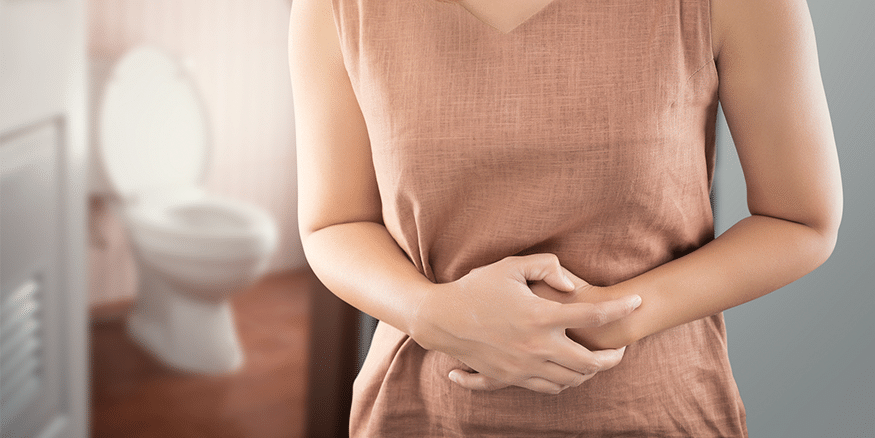
10 Nutrition and Lifestyle Recommendations to Manage Diarrhea
There are many causes of diarrhea, including chronic diseases and temporary illness. For short-term sickness, such as food poisoning, it can be helpful to follow a strict diet until you recover. If you have a chronic disease, such as Crohn’s disease, ulcerative colitis, or irritable bowel syndrome, you should make small adjustments and see what does and doesn’t improve your symptoms. Remember that if you change your diet significantly, it is important to speak with a registered dietitian to ensure that you are still meeting your nutritional needs.
1. Stay hydrated
Aim to drink at least 8-10 cups of fluid per day to replenish losses. Sipping fluids throughout the day will give your body more time to absorb them and prevent triggering diarrhea. Fluids to drink include water, herbal teas, 100% vegetable juices, oral rehydration solutions (homemade or store-bought), broth, and simple smoothies made with bananas and milk (lactose-free if you are sensitive to lactose) or milk alternatives.
2. Enjoy smaller frequent meals
This allows your body to process and digest the volume of food that you’ve eaten, as smaller volumes of food are less likely to trigger diarrhea. Consider having 5-6 small meals per day.
3. Include salt
Salt helps your body to retain and absorb fluid and replenish losses. Sprinkle salt onto your meals or enjoy salty foods like plain crackers, pretzels, or bone broth. If you are on a salt restriction for medical reasons, please consult with your doctor or dietitian to reassess your individual needs.
4. Consider a probiotic supplement
A daily probiotic supplement with at least 10 billion CFU/dose can help replenish healthy gut microbes and improve diarrhea. The microbial strain Lactobacillus rhamnosus GG and the yeast Saccharomyces boulardii are two types of microorganisms that may help. Check out the annually updated and evidence-based Canadian probiotic guide for effective brands at probioticchart.ca.
5. Consider a fibre supplement
Start with one teaspoon of partially hydrolyzed guar gum (PHGG) or 100% ground psyllium husk fibre and monitor your symptoms. Increase the dose as needed and tolerated (e.g., one teaspoon two or three times per day), and drink at least 1-2 cups of fluid per teaspoon of added fibre.
6. Consider short-term zinc supplementation
If you are having excessive or prolonged diarrhea, you may need to replenish zinc losses. Ask your doctor, pharmacist, or dietitian, to see if you should supplement your diet.
7. Consider a short-term trial of the low FODMAP diet if the cause of diarrhea is IBS
The underlying cause of diarrhea is important to figure out before trying the low FODMAP diet.
8. Avoid magnesium supplementation:
Magnesium has a laxative effect and can worsen diarrhea during this time.
9. Foods to choose
- soluble (soft) fibre: applesauce, bananas, banana chips, mashed and skinless potatoes, squash, carrots, yams, blended soups (potatoes, yams, squash), quick or rolled oats (oatmeal, overnight oats), white bread without seeds (oat, 100% sourdough)
- foods that can help firm up bowel movements: soluble fibre (above), congee (savory rice porridge), chia seed pudding (lactose-free, can also make with ground chia seeds), gelatin, plain salted crackers, white rice (sticky, arborio), smooth nut and seed butters (e.g., peanut or sunflower), aged cheddar cheese, lactose-free tapioca, or rice pudding
- easy-to-digest proteins that are lower in fat: egg, chicken, turkey, tofu, lean fish (e.g., canned tuna), aged cheddar, plain lactose-free yogurt (1-2%), and protein powder
- cooked vegetables, especially mashed or blended: e.g., vegetable soup
10. Foods to limit and avoid
- insoluble (tough) fibre: whole nuts and seeds, popcorn, dried fruit, green peas, corn, skins of vegetables and fruits, raw vegetables, wheat bran, whole flaxseeds, high fibre whole grains (brown rice, quinoa, granola, and breads or bagels with seeds)
- spicy foods
- high fat, greasy, and deep-fried foods
- high sugar foods: concentrated fruit juices, syrups, chocolate milk, and regular soda
- sugar alcohols:g., sorbitol, mannitol, maltitol, xylitol, found in sugar-free candy, chocolate, and gum
- caffeine: coffee, strong black tea, energy drinks, caffeinated sodas, and dark chocolate
- lactose: temporarily avoid foods high in lactose (regular milk, fresh cheeses, ice cream), and choose low lactose foods instead (e.g., aged cheddar, yogurt)
- natural laxatives: prunes, prune juice, papaya, rhubarb, and kiwis
- alcohol















